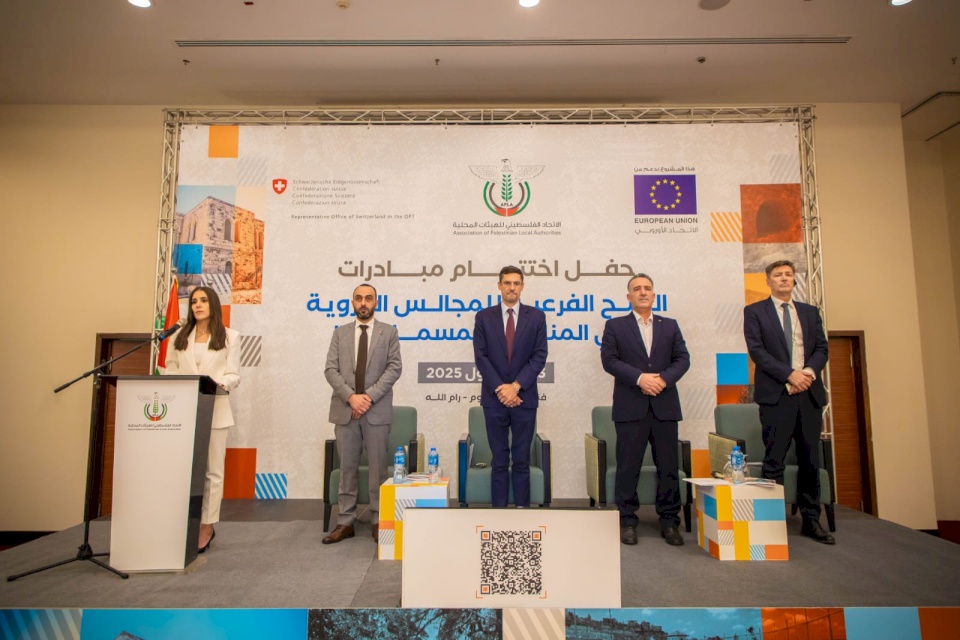
The Palestinian Union of Local Authorities Concludes Sub-Grant Initiatives with 25 Projects to Enhance the Resilience of Villages in the Areas Known as 'C'
SadaNews - The Palestinian Union of Local Authorities held a closing ceremony for the sub-grant initiatives funded by the European Union and the Swiss Agency for Development and Cooperation, which included the implementation of 25 development projects for the benefit of village councils in the areas known as 'C'. These initiatives varied from the rehabilitation of public squares, development of natural springs and historical wells, establishment of gardens and parks, enhancement of cultural heritage, in addition to providing new job opportunities and boosting local revenues, to solidify the role of village councils as institutions leading development and providing the components of resilience in one of the most challenging Palestinian environments.
The event witnessed high-level attendance, led by His Excellency the President of the Union Abdel Karim Al-Zubeidi, His Excellency Mr. Alexander Stutzmann, representative of the European Union, and His Excellency Mr. Philip Boettler, head of the International Cooperation Department at the Swiss Agency for Development and Cooperation representing the Swiss representation, alongside heads of local authorities, representatives of partner and supporting institutions, and the executive staff of the union.
The President of the Union, Abdel Karim Al-Zubeidi, affirmed in his speech that the implemented initiatives formed acts of life in besieged environments and political and community protection tools for the Palestinian existence, stressing that local governance has become at the heart of the daily confrontation with annexation and restriction policies. He considered that development in these villages is no longer a deferred luxury but a condition for survival and a message of daily resilience. He added that these local experiences intersect with the broader political path represented in the rising international recognition of the State of Palestine, emphasizing that this recognition is no longer just a symbolic declaration but a tangible entitlement that requires the protection of state institutions, especially local authorities which represent the first line of defense for people's lives and their rights.
For his part, the representative of the European Union, Alexander Stutzmann, emphasized that EU support for these initiatives is not just a technical or financial contribution, but a clear political stance reflecting a steadfast commitment to Palestinian rights. He confirmed that local authorities are the backbone of daily life for citizens, and empowering them is the first line of defense for justice, dignity, and the right to development. He also added that the EU's decision to invest in the areas known as 'C' carries a political significance that cannot be misinterpreted, as it is an integral part of Palestinian land, asserting that this strategic partnership will continue strongly despite the conclusion of this phase of initiatives.
The representative of the Swiss Agency for Development and Cooperation, Philip Boettler, confirmed that work in municipalities and local communities is not a passing service, but a historical responsibility requiring long-term commitment. He noted that Switzerland, since 2009, has made supporting local governance and a decentralized approach in Palestine a fixed pillar in its development policies, viewing that empowering municipalities and village councils is the cornerstone for building more just and equitable communities. After reviewing the results of the 25 implemented initiatives, he renewed his country's commitment to continue supporting local services and ensuring their access to all citizens, affirming that this support reflects a genuine confidence in the ability of Palestinian local authorities to protect and serve their communities.
The executive director of the union, Abdullah Anati, presented a strategic overview based on a broader multi-year action plan, highlighting how the sub-grant initiatives formed part of a comprehensive vision to enhance the capacities of village councils and expand areas of resilience in the areas known as 'C'. He affirmed that this path was not isolated from other interventions by the union, but rather aligned with training programs, technical support, and national policies led by the union in cooperation with its international partners. He explained that combining the direct developmental aspect – from rehabilitating public squares and developing historic wells – with the long-term institutional aspect is what made the experience a political and developmental tool simultaneously, restoring local governance as a key player in shaping a more just and equitable future for Palestinians.
The ceremony concluded with an interactive tour among the corners showcasing fact sheets pertaining to the projects, which formed a live platform for networking between village councils and international partners, and opened a direct space to review the experiences and results that solidified the presence of local authorities at the heart of "Area C".

After More than Two Years of War on the Gaza Strip, the Return and Loyalty Chess Champions...

Gaza Police Arrest Suspects in Citizen's Murder

Ramallah and Al-Bireh Forces Call for National Cohesion and Solidarity to Face Challenges

Settlers Steal 200 Sheep and a Vehicle in Kober North of Ramallah

More than 38,000 travelers crossed through the Al-Karama crossing last week

Weather Conditions: Extremely Cold Weather

Thousands Perform Friday Prayer at Al-Aqsa Mosque

